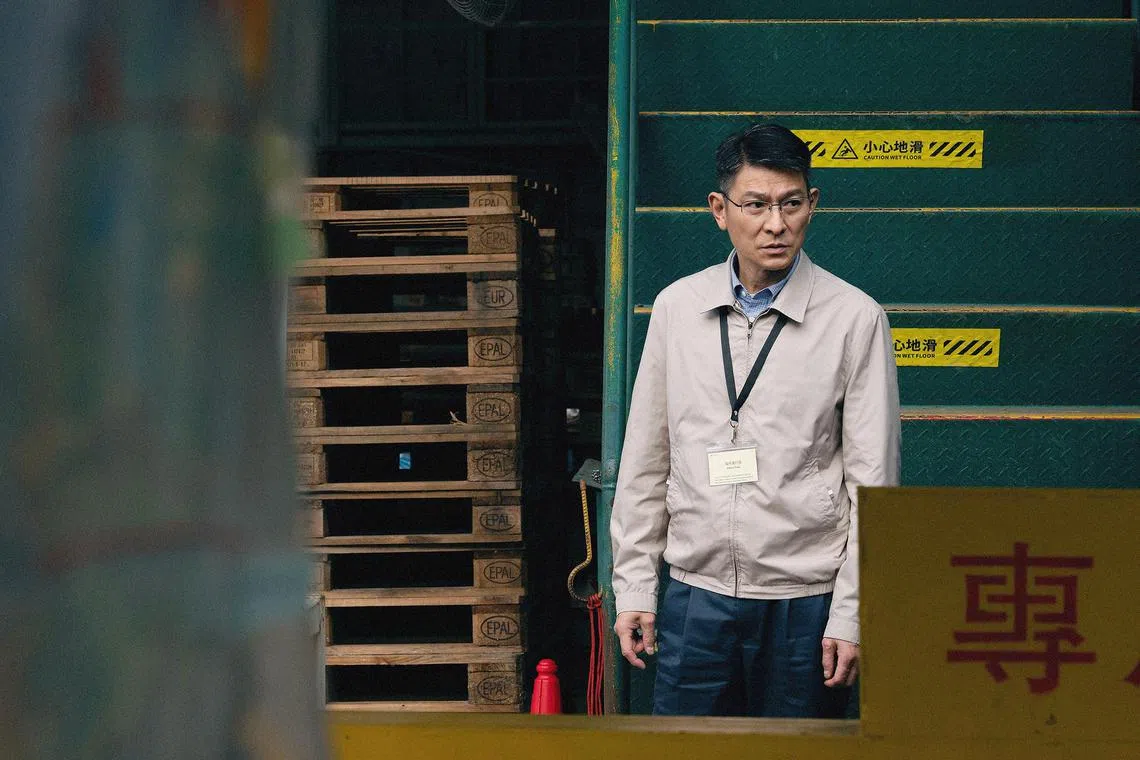At The Movies: Cesium Fallout delivers bang for your buck, We Live In Time a tiresome tearjerker
Sign up now: Get ST's newsletters delivered to your inbox

Hong Kong actor Andy Lau in Cesium Fallout.
PHOTO: MM2 ENTERTAINMENT
Follow topic:
Cesium Fallout (NC16)
138 minutes, opens on Nov 7 ★★★☆☆
The story: In what is billed as Hong Kong’s first radiation disaster blockbuster, the fate of seven million citizens is in the balance when a fire at a recycling plant exposes a Cesium-137 radioactive leak.
Cesium Fallout is Japan’s Shin Godzilla (2016) with Hong Kong idol Andy Lau instead of a kaiju as the marquee star. Both doomsday blockbusters are takedowns of government indecision in the face of a national nuclear emergency.
Lau’s Simon Fan is the environment protection pundit on the crisis response task force, his containment measures systemically challenged by Karen Mok’s bossy acting chief executive and her quivering cabinet.
The self-serving politicians in their cushy boardroom, squandering precious minutes of a 24-hour drama, are contrasted against the self-sacrificing working-class firefighters on the front line.
Linking the parallel narrative is a personal vendetta: In the 1996 prologue, Simon was the finance secretary whose bad policy caused the death of his wife, and his bitter brother-in-law (Bai Yu) is the fire department officer now leading the relief operation to locate and remove the hazardous chemicals.
Director Anthony Pun is an award-winning cinematographer (The Goldfinger, 2023; Divergence, 2005) of three decades, which accounts for the many welcome veterans in the ensemble cast – Tse Kwan-ho, Bowie Lam, Kent Cheng, David Chiang and Michael Wong – and the visual command in rendering the city-wide devastation.
Amid the explosions, charred bodies and mass panic, the fire crew discovers electronic waste from a politically connected smuggling network. This, then, is the source of the leak.
The apocalyptic spectacle is tense until it becomes exhausting. Nonetheless, it gets the warning across that man-made catastrophes are worse than anything nature can wrought.
Hot take: This environmental thriller is nuclear-level bang for your buck – big, unsubtle entertainment.
We Live In Time (M18)
108 minutes, opens on Nov 7 ★★☆☆☆
The story: Rising chef Almut (Florence Pugh) and newly divorced marketeer Tobias (Andrew Garfield) have a chance encounter when she runs him over with her Mini Cooper on the road. Hence begins their life together.

Andrew Garfield (left) and Florence Pugh in We Live In Time.
PHOTO: SHAW ORGANISATION
We Live In Time tracks three different periods along the decade-spanning relationship of the 30-something couple in South London. There is their passionate falling in love and young parenthood, and then the discovery that Almut’s cancer has recurred.
Huh? When was she first diagnosed?
The romantic weepie, it should be noted, is non-linear, told out of sequence from start to finish. What came before – however significant the development – is often randomly filled in long after for no defensible reason except, perhaps, the worry that a straightforward story of a woman finding her soulmate and then getting sick would be pedestrian.
It need not be so. Love Story (1970) still guarantees a good cry.
The Irish director is furthermore John Crowley, whose crime drama Boy A (2007) was Garfield’s feature acting debut.
His sensitivity earned a Best Picture Academy Award nomination for Brooklyn (2015), and much like the Irish immigrant played by Saoirse Ronan choosing between two homes, this movie – conceived by British playwright Nick Payne – is Almut’s self-actualisation journey, deciding how to live her final months. And entering the elite international chef championship, the Bocuse d’Or, is her decision.
English actress Pugh is convincingly ardent. Garfield is left standing around, looking sad, as headstrong, high-achieving Almut rejects the debilitating rounds of chemotherapy and surgery to fulfil her vocation.
But the erratic narrative structure allows for no character arc, no dramatic build-up to the tragedy and no emotional catharsis.
Hot take: Love is complicated enough without this tearjerker’s exasperating fractured chronology.


